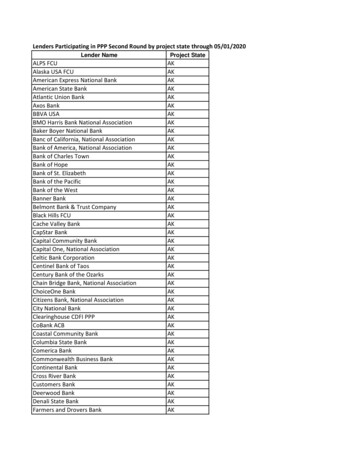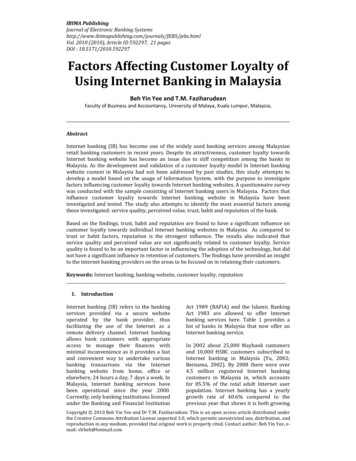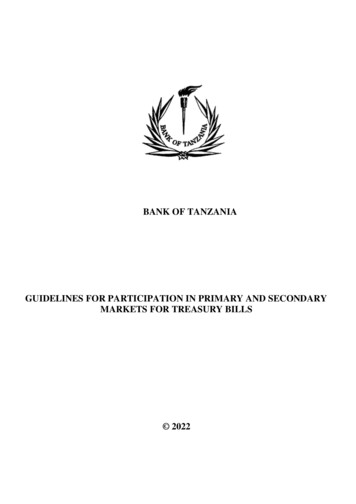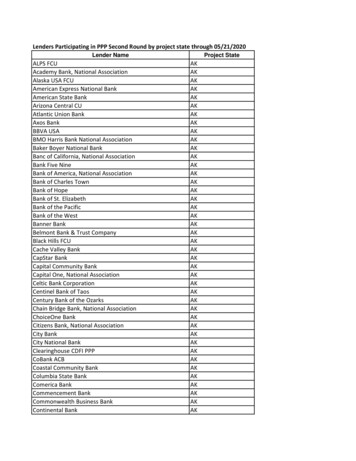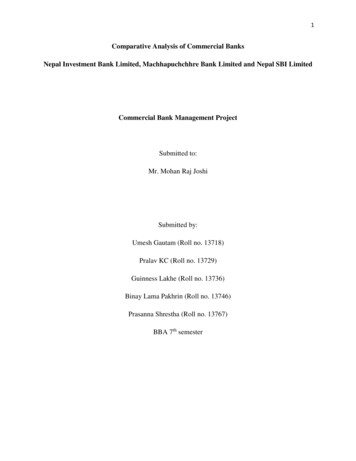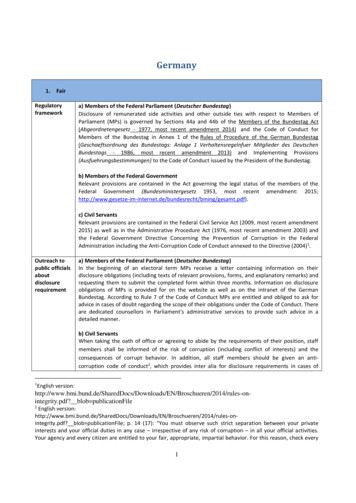
Transcription
Germany1.FairRegulatoryframeworka) Members of the Federal Parliament (Deutscher Bundestag)Disclosure of remunerated side activities and other outside ties with respect to Members ofParliament (MPs) is governed by Sections 44a and 44b of the Members of the Bundestag Act(Abgeordnetengesetz - 1977, most recent amendment 2014) and the Code of Conduct forMembers of the Bundestag in Annex 1 of the Rules of Procedure of the German Bundestag(Geschaeftsordnung des Bundestags: Anlage 1 Verhaltensregelnfuer Mitglieder des DeutschenBundestags - 1986, most recent amendment 2013) and Implementing Provisions(Ausfuehrungsbestimmungen) to the Code of Conduct issued by the President of the Bundestag.b) Members of the Federal GovernmentRelevant provisions are contained in the Act governing the legal status of the members of theFederal Government (Bundesministergesetz 1953, most recent amendment: /bming/gesamt.pdf).c) Civil ServantsRelevant provisions are contained in the Federal Civil Service Act (2009, most recent amendment2015) as well as in the Administrative Procedure Act (1976, most recent amendment 2003) andthe Federal Government Directive Concerning the Prevention of Corruption in the FederalAdministration including the Anti-Corruption Code of Conduct annexed to the Directive (2004)1.Outreach topublic officialsaboutdisclosurerequirementa) Members of the Federal Parliament (Deutscher Bundestag)In the beginning of an electoral term MPs receive a letter containing information on theirdisclosure obligations (including texts of relevant provisions, forms, and explanatory remarks) andrequesting them to submit the completed form within three months. Information on disclosureobligations of MPs is provided for on the website as well as on the intranet of the GermanBundestag. According to Rule 7 of the Code of Conduct MPs are entitled and obliged to ask foradvice in cases of doubt regarding the scope of their obligations under the Code of Conduct. Thereare dedicated counsellors in Parliament’s administrative services to provide such advice in adetailed manner.b) Civil ServantsWhen taking the oath of office or agreeing to abide by the requirements of their position, staffmembers shall be informed of the risk of corruption (including conflict of interests) and theconsequences of corrupt behavior. In addition, all staff members should be given an anticorruption code of conduct2, which provides inter alia for disclosure requirements in cases of1English s/EN/Broschueren/2014/rules-onintegrity.pdf? blob publicationFile2English s/EN/Broschueren/2014/rules-onintegrity.pdf? blob publicationFile; p. 14 (17): “You must observe such strict separation between your privateinterests and your official duties in any case – irrespective of any risk of corruption – in all your official activities.Your agency and every citizen are entitled to your fair, appropriate, impartial behavior. For this reason, check every1
possible conflict of interests. Staff members working in or transferred to areas especiallyvulnerable to corruption are given additional, job-specific instruction at regular intervals.Type ofinformationdiscloseda) Members of the Federal Parliament (Deutscher Bundestag)The focus of disclosure is primarily on the business activities and conflict of interest in regards topositions held, with less interest on properties. Received gifts and sponsored travels are alsodeclared. Properties: Interests held in a company or partnership, if this results in 25 percent of thevoting rights Investments and Liabilities: not required. Income: According to Rule 1(2) no. 1 of the Code of Conduct, MPs are required to discloseremunerated activities or agreements.The provision of expert opinions and writing orlecturing activities have to be declared only if the income thereof exceeds 1,000 permonth or 10,000 per year. The amount of income from any activity has to be declared ifit exceeds 1,000 within one month or 10,000 within one year (Rule 1 (3) of the Codeof Conduct). Positions: Activities as a member of a board of management, supervisory board,administrative board, advisory board or other body of a company, a corporation orinstitution under public law, a club, association or similar organization, or of a foundationof not exclusively local importance, must be declared regardless of whether the activity isremunerated or not (Rule 1 (2) no. 1 to 4 of the Code of Conduct). If the activity inquestion is remunerated, then income has to be declared too, if it exceeds 10,000 peryear (Rule 1 (3) of the Code of Conduct). Gifts and Travel: Gifts which MPs receive as a guest in connection with their mandatehave to be notified and handed to the President of the Bundestag if the value exceeds 200. Members may apply to keep the gift if they pay a sum equivalent to its value. Otherbenefits, such as reimbursement of travel, accommodation and subsistence expenses bythird parties received in connection with inter-parliamentary or international activities orparticipation in events to state the viewpoints of the Bundestag or of its parliamentarygroups or as representative of the Bundestag, must be notified (i.e. name and address ofthird party sponsor) to the President if the value of the benefit individually or, in the caseof several benefits from the same person, taken together, exceeds 5000 in one year(Rule 4 (5) of the Code of Conduct).b) Members of the Federal Government Positions and Incomes: Members of the Federal Government may not hold any paidoutside positions. Exemptions can be made by the Federal Government in limitedexceptional cases.procedure for which you are also responsible to see whether your private interests or those of your relatives or oforganizations to which you feel obliged could lead to a conflict with your professional obligations. Avoid anyappearance of possible partiality. Make sure you do not give any appearance of being biased, not even through ageneral climate of influence exerted by an interested party.If you recognize, given a specific official task, that your obligations and your private interests or the interests of thirdparties to whom you feel obliged might come into conflict, inform your supervisor so that he or she may respondappropriately (e. g. by releasing you from activities in a specific instance).”2
Since 25 July 2015, new legal provisions, regulating cooling-off periods for members ofthe Federal Government, as well as for Parliamentary State Secretaries, are in force. Theregulations are intended to prevent conflicts of interest between the official position andsubsequent employment. Members of the Federal Government and Parliamentary StateSecretaries are obliged to report any employed position outside the public service whichthey intend to assume within a period of 18 months after resignation from office. Suchemployment may be prohibited when the public interest would otherwise be impaired. Gifts: Members of the Federal Government have to declare gifts received in relation totheir office to the Federal Government. The Federal Government decides on the disposalof the gifts.c) Civil Servants Properties, Investment and Liabilities, Incomes, Gifts and Travel: If a civil servantrecognizes, given a specific official task, that his/her obligations and private interests orthe interests of third parties to whom he/ she feels obliged might come into conflict, thepublic official is under a duty to inform his/her supervisor so that he/she may respondappropriately (e. g. by releasing the public official from activities in a specific instance);such obligations and interests can include properties, investments, liabilities, incomes,gifts and travels.Other relevantinformation Positions and Income: Civil servants may only take up outside activities with priorapproval of their office. When seeking approval, civil servants have to declare the incometo be received from the outside activities; in addition, civil servants have to declare anychanges in their income from outside activities. The requirement for reporting and/or apermission to accept secondary employment is thoroughly regulated in sections 97 to 105of the Act on Federal Public Servants (Bundesbeamtengesetz) and the Ordinance onSecondary Employment (Nebentätigkeitsverordnung), both applying to federal publicservants, and in the Act on the Status of Public Servants (Beamtenstatusgesetz) andLänder legislation for public servants of the states (Länder). In case of a conflict ofinterest, staff may be prohibited from specific secondary employment. Gifts: Civil servants are prohibited from accepting gifts or any other in-kind advantages,irrespective of their value. If they should receive a gift, civil servants have to immediatelynotify the head of their office and declare the receipt of the gift.Members of the Federal Parliament (Deutscher Bundestag)In addition, MPs have to disclose to the President of the Parliament all donations, includingcampaign contributions, they receive if the value of donation individually or, in the case of severaldonations from the same donor taken together, exceeds 5,000 per year (Rule 4 (2) of the Code ofConduct). If the aggregated value of donations exceeds 10,000, the President of the Parliamentwill make this disclosure public (Rule 4 (3) of the Code of Conduct). This provision applies only todonations received for their political activity, not private gifts (Rule 4 (1) of the Code ofConduct).Private gifts for the exercise of a MP’s mandate, in particular such gifts which are onlygranted in the expectation that the interests of the donor will be represented and asserted in theBundestag must not be accepted (Section 44a (2) of the Members of the Bundestag Act). Likewisedonations for their political activity evidently made in the expectation of, or in return for, somespecific financial or political advantage must not be accepted (Rule 4 (4) of the Code of Conduct in3
connection with Section 25 (2) of the Political Parties Act).Additional requirement to declare income according to tax laws, and disclosure of facts toprosecution by taxation authoritiesAll inhabitants of Germany who have earnings above a certain threshold are obliged to file anannual tax return. For persons who receive a salary from which income tax is already deducted(which applies to all persons working in the public administration), that threshold amounts to 410Euro per year. In the tax return, all taxable income has to be reported. This also applies tomembers of parliaments, whose remuneration is taxed, members of the government, and civilservants. Illegal earnings are taxable and, thus, also have to be declared. If the illegal earnings arenot reported in the tax return, and thus, they are not taxed, this constitutes the crime of taxevasion. In severe cases of corruption or misappropriation of public funds, the facts may bedisclosed to prosecution authorities by the taxation authorities if “there is a compelling publicinterest in such disclosure; such compelling public interest shall be deemed to exist in particularwhere [ ] crimes and wilful serious offences against [ ] the State and its institutions are being orare to be prosecuted, [ ] economic crimes are being or are to be prosecuted, and which in view ofthe method of their perpetration or the extent of the damage caused by them are likely tosubstantially disrupt the economic order or to substantially undermine general confidence in theintegrity of business dealings or the orderly functioning of authorities and public institutions [ ].”2.TransparentPublicaccessibility ofdisclosedinformationa)Members of the Federal Parliament (Deutscher Bundestag)According to Section 44a(4) of the Members of the Bundestag Act and Rule 3 of Code of Conduct,the information contained in declarations is publicly available. Information relating to income fromside activities will be published in categories. Information on benefits, such as reimbursement oftravel, accommodation and subsistence expenses by third parties received in connection withinter-parliamentary or international activities or participation in events to state the viewpoints ofthe Bundestag or of its parliamentary groups or as representative of the Bundestag, will bepublished if the value of the benefit individually or, in the case of several benefits from the sameperson, taken together, exceeds 10000 in one year (rule 4 (5) of the Code of Conduct).The information contained in declarations is published in the Official Handbook and on thewebsite of the German Bundestaghttp://www.bundestag.de/htdocs e/index.html.b) Civil ServantsDisclosed information is not publicly accessible.Public accessto mbers of the Federal Parliament (Deutscher Bundestag)Only cases of non-compliance are required to be reported and given some kind of publicity.Admonishments, which are issued by the President of the Bundestag in less serious cases, or casesof minor negligence (e.g. failure to declare information before the relevant deadline), are notpublished. Admonishments have been issued several times but there are no statistics on this issue.In more severe cases of non-compliance a statement by the Presidium of the Bundestag that the4
MP concerned has failed to meet their obligations will be published, and, the Presidium maydecide to impose a coercive fine (Rule 8 of the Code of Conduct). This has happened twice so far.Other relevantinformation3.Targeted at senior leaders and those in at-risk positionsLegislativeMembers of the Federal Parliament (MPs)ExecutiveIn cases where Ministers are also MPs, they are subject to the same provisions as MPs.JudiciaryThe disclosure requirements for civil servants apply mutatis mutandis to members of the judiciary.OtherCivil Servants fall under the disclosure requirements described above under section (1)Fair/Regulatory Framework, (c) on Civil Service.Risk-basedapproach tothe disclosurerequirementNo risk-based approach taken.Other relevantinformationSpouses and children are not required to declare their assets, income, or liabilities.4.Supported with adequate resourcesMain agency/agenciesinvolved indisclosurea) Members of the Federal Parliament (Deutscher Bundestag)Bundestagsverwaltung (Parliament’s Administrative Services) on behalf of the President of theParliament.b) Civil ServantsThe head of each office is responsible for the compliance with the disclosure requirementsdescribed under section (1) Fair/Regulatory Framework,(c) on Civil Servants.Other entitiesNone.Other relevantinformation5
5.UsefulFrequency offilingrequirementa) Members of the Federal Parliament (Deutscher Bundestag)MPs have to submit their declarations within three months upon taking office and when there areany changes (Rule 1 (6) of the Code of Conduct).b) Civil ServantsCivil servants have to make a declaration whenever a possible conflict of interests appears.Members of the Federal Parliament (Deutscher Bundestag)Validation &verificationUses ofdisclosedinformationOfficials of Parliament’s Administrative Services will check if the submitted form is completebefore they publish the disclosed information. If the information given is incomplete orambiguous they will notify the MP concerned and ask for clarification.If there are indications that a MP has failed to meet his or her obligation to provide correct andcomplete information within the relevant deadline, the President of the Bundestag, according toRule 8 of the Code of Conduct for Members of the Bundestag, will gain a statement from the MPconcerned and then set in motion an investigation of the case.a) Members of the Federal Parliament (Deutscher Bundestag)As far as information is published on the website and in the Official Handbook of the GermanBundestag (cf. section 2) it can be “used” by the voter when deciding on re-electing a candidate.Disclosed information can also be used by the Bundestag’s President and presidium wheninvestigating violations of the Code of Conduct and deciding on sanctions according to Section 8of the Code of Conduct. The question as to whether the disclosed information could be used forcriminal proceedings has not yet been decided and no precedent exists. In any case, its use incriminal proceedings must not infringe on the concerned person’s right not to incriminate him orherself.b) Civil ServantsDisclosed information is used to avoid and resolve possible conflict of interests. It can also beused as evidence in disciplinary as well as in criminal proceedings provided that this does notinfringe on the concerned person’s right not to incriminate him or herself.Other relevantinformation6.EnforceableTypes ofapplicablesanctionsa) Members of the Federal Parliament (Deutscher Bundestag)MPs may be subject to: an admonishment by the President of the Bundestag in less serious casesor cases of minor negligence, e.g. late filing; administrative sanctions, including publication oftheir violation and imposition of coercive fines (Rule 8 (2) (4) of the Code of Conduct)The size of the fine depends on the gravity of the violation. It may not exceed 50 percent of theannual remuneration for MPs.b) Civil ServantsNon-disclosure of information relevant to a possible conflict of interests can lead to disciplinary6
sanctions against the civil servants (Members of the Federal Government shall not be subject todisciplinary proceedings -section 8 of the Act governing the legal status of members of the FederalGovernment). Public Servants of the states (Länder) could be subject to disciplinary sanctionsaccording to the Act on the Status of Public Servants (Beamtenstatusgesetz) and Länderlegislation.In addition, for a civil servant accepting a gift or any other advantage (irrespective of its value) forthe discharge of an official duty is a criminal offence carrying a punishment of up to three yearsimprisonment.Mechanismand entitiesresponsible forenforcingmeasuresa) Members of the Federal Parliament (Deutscher Bundestag)The President of the Parliament initiates an investigation if there are indications of breach of theduty to disclose (Rule 8 (1) of the Code of Conduct).b) Civil ServantsDisciplinary and penal procedures apply. Disciplinary procedures are initiated by the head of theoffice. The same applies to criminal procedures; they can also be initiated ex officio or following acomplaint by a third partyOther relevantinformation7
Members of the Bundestag in Annex 1 of the Rules of Procedure of the German Bundestag (Geschaeftsordnung des Bundestags: Anlage 1 Verhaltensregelnfuer Mitglieder des Deutschen Bundestags - 1986, most recent amendment 2013) and Implementing Provisions

